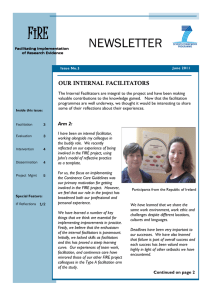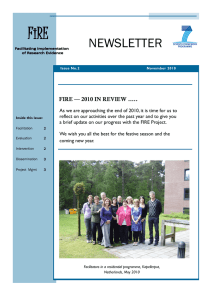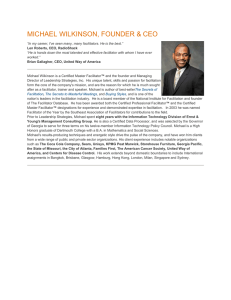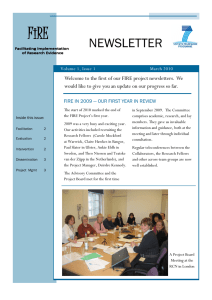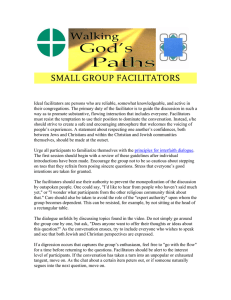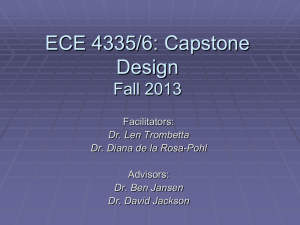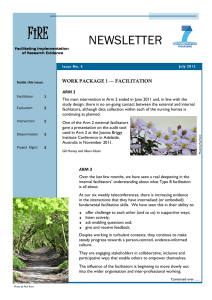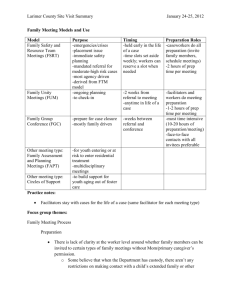FiRE NEWSLETTER Creating a person-centred culture Best wishes to everyone for the
advertisement
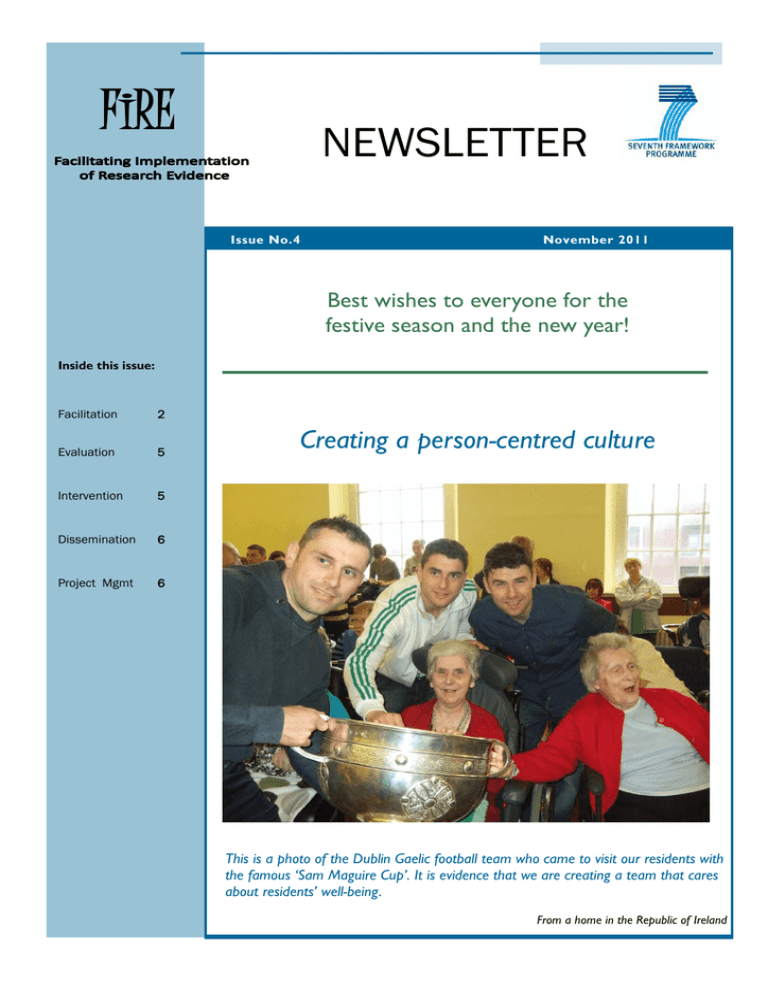
Issue No.4 November 2011 FiRE NEWSLETTER Issue No.4 Issue No.4 November 2011 November 2011 Best wishes to everyone for the festive season and the new year! Inside this issue: Facilitation 2 Evaluation 5 Intervention 5 Dissemination 6 Project Mgmt 6 Creating a person-centred culture This is a photo of the Dublin Gaelic football team who came to visit our residents with the famous ‘Sam Maguire Cup’. It is evidence that we are creating a team that cares about residents’ well-being. From a home in the Republic of Ireland Page 2 WORK PACKAGE 1 — FACILITATION ARM 2 The main intervention in Arm 2 ended in May of this year. To mark this end point, the internal facilitators and buddies from seven of the arm 2 nursing homes attended a two day meeting in Stockholm in June 2011. The meeting took place in the wonderful setting of one of the Swedish arm 2 nursing homes, with wonderful views over the city of Stockholm. Each participant gave a short presentation to feedback on their experience of the FIRE project and the achievements they have made in implementing the continence guideline recommendations in their nursing home. We heard some really excellent presentations from the participating homes and the meeting had a real celebratory feel to it. At the same, we took time to reflect on our experiences of the FIRE Project: what has worked well, what we have learned, and what we would do differently if starting again. This feedback will be incorporated into the overall data collection and analysis for the FIRE study. We ended the two days thinking about the next steps to sustain and spread the improvements made in the nursing homes and ways to disseminate the learning of the internal facilitators and their colleagues. Some of the internal facilitators with Alison Kitson in Stockholm Issue No.4 Page 3 ARM 3 Evaluation of teleconferences Overall, good progress is being made and the facilitators remain very committed to the project. April 2011 Each month, in advance of the teleconference, the facilitators (and one of the buddies) send in their progress reports and inquiry questions. The facilitators then help each other to find their own answers to their questions and share their own experiences as well. A recent review of the methods the facilitators are using in the workplace shows that many different approaches are being used and that methods are being modified or created to suit particular contexts. Peer support at the regular teleconferences remains vital for keeping up morale and releasing energy for the work. Over the summer, a number of challenges have been encountered. One facilitator unfortunately had to withdraw from the study due to illness, but the organisation wish to remain in the study and negotiations for a new facilitator are in progress. The buddy of another facilitator who is on long-term sick leave has stepped up to take her place whilst her colleague is off sick. She is catching up with impressive speed. Another buddy has left the project due to a job change and finding a replacement buddy has been unsuccessful so far. Negotiating time for the study remains problematic for some. Despite these difficulties, evaluations of the meetings show that the facilitators value the opportunity to come together regularly for learning, reassurance and making progress. My key learning is Collaboration, Inclusion and Participation (CIP) to make it more into practice and think about how important it is. How to involve the stakeholders and how to take little steps and discuss with the group members. ‘I am just about to start now so to see that others have problems too makes setting out on the project less daunting for me.’ ‘My learning is to focus on the positive things people will share with you instead of thinking down in the negative.’ ‘ have to learn to reflect when I am talking to people why they are saying things.’ ‘I learned from Brendan and Angie’s example of not telling us what to do but to write a reflection and think how you might resolve the problem. I will use that in my facilitation.’ External facilitator (EF) ‘My key learning was affirming the importance of checking out energy levels in a virtual meeting – the energy is palpable virtually and as a facilitator it is useful to pay attention to that.’ June 2011 ‘I learned about the interventions and how one simple question can have so many different functions and purposes.’ ‘I learned from [facilitator’s] ways of working but it means that I have a long way to go yet.’ Continued over Page 4 Arm 3 continued can do especially around the time problem.’ ‘I learned that deconstructing the questions and interventions is very good learning and it helps to have the questions recorded as they were said so that they can be analysed.’ ‘My key learning is about role clarification – really important for us to do it again and again to make time free for the FIRE ...Sometimes we can pull back from FIRE. Maybe we have to go on a lower level for now.’ August 2011 ‘The session was challenging. I found that I was pushed quite a bit to clarify what I was doing and found it very helpful. I have ideas for going forward. I found it difficult today but I feel supported and able to take it forward.’ EF: ‘We have really been digging a bit deeper and exposing the complexity of facilitation and starting to analyse it more. Huge improvement since we tried to do this at the last supervision. I feel energised today when I often feel drained at the end of these sessions. The depth of discussion and engagement has been significant.’ EF ‘challenge of sustaining energy in this work – not short term – people underestimate how challenging it is over time. Really important is the need to nurture self.’ EF ‘despite the challenges of IT and language, there has been some really deep learning. So good session today.’ September 2011 One word to carry you through the next steps Connection Reassured Gentle progress Optimism ‘My learning today is that personal experiences can impact on work-life! I am an adult and have to take responsibility for myself.’ ‘I had a great time today – to take part in this conference, hearing everyone’s problems and what you An autumn dawn near Stoneleigh, Warwickshire, UK taken by P Kent Issue No.4 Page 5 WORK PACKAGE 2 — EVALUATION The research team met in September to begin discussing findings that are emerging across sites and countries. Perhaps unsurprisingly patterns are emerging about how facilitation is being operationalised within the different homes, and what influences these processes and the delivery of best practice in continence care. We are working on evaluating some very high level propositions from the evaluation data that has been collected including: The type of facilitation approach within home environments with particular infrastructure, organisation of service delivery, and cultures will impact on resident, next of kin, facilitator, home and staff outcomes, processes of care and experiences The nature of the internal – external facilitator relationship and support will impact on internal facilitators abilities, skills, knowledge to enact their role in practice. The impact on continence practice and outcomes of specific facilitator activities and practices with be enabled or inhibited within different types of contextual conditions and by the characteristics of home staff, including home managers. The team is meeting again in January 2012 at Bangor University to do more detailed data analysis on these propositions from the data we have collected so far. WORK PACKAGE 3 —INTERVENTION The intervention researchers also met in September to discuss progress and challenges across the sites. We are uploading all anonymised data to a central secure site in the UK. We will be analysing the data, and will look at the extent to which the recommendations are implemented and identifying whether there has been any impact on resident outcomes. It is now almost 18 months since our initial training programme. The researchers will be visiting all the sites again at 18 and 24 months after the training took place. Kate Seers and Nicola Crichton (our project statistician) met with the Data Monitoring Committee members in June 2011 to present and discuss the baseline data. The committee’s comments were very helpful. They were supportive and understanding of the challenges in recruiting from this particular population. We will be bringing the committee together again early in the new year. Page 6 WORK PACKAGE 4 — DISSEMINATION As part of our stakeholder engagement strategy to inform and refine the theoretical propositions that underpin the FIRE study, we held a workshop at the Knowledge Utilisation Colloquium (KU11) in Belfast in June 2011. An open invitation was issued to all KU11 participants prior to the event and over thirty delegates attended the workshop. The programme for the event was designed to focus on two main issues: from the workshop was the need to target relevant information to the right stakeholder groups, given the broad range of stakeholders that are likely to be interested in the FIRE study findings as they become available, for example: country level policy makers, continence experts, industry, the media, advocates for older people, relatives of older people and charities. Presenting, discussing and testing the theoretical propositions upon which the FIRE study has been designed; Developing an integrated dissemination and knowledge translation strategy for the study. As part of the ongoing work on the dissemination strategy, we are starting a more detailed planning process to identify the relevant stakeholder groups at a national level and plan dissemination activities accordingly. The session commenced with a short overview of the FIRE project, outlining the theory-driven methodology that underpins the study. This was followed by small group discussion to identify theoretical propositions that might be relevant and useful to explore in the FIRE study. A total of 22 statements were identified, which will be fed into the next stage of developing and refining the study propositions, work that is being led by the evaluation team members of the FIRE study. Thinking about the dissemination and knowledge translation strategy for the FIRE study, a key message that emerged We are planning to have a third and final stakeholder consultation workshop at the KU12 meeting in Melbourne in October 2012, by which time the data collection for the study will be completed. G Harvey and A Kitson gave a presentation on the data package used in Arm 2 at the JBI Conference in Adelaide in November which generated a lot of interest. If you would like more information on how to get involved or to receive more information about the study, please feel free to contact Deirdre Kennedy, our Project Manager: tel 0044 (0)24 761 50625 or email d.r.kennedy@warwick.ac.uk. WORK PACKAGE 5 — PROGRAMME AND CONSORTIUM MANAGEMENT We are fast approaching both the end of 2011 and third year of the FIRE project. as a Research Associate in September 2011. Both are welcome additions to the team. In July 2011 Claire New joined our Warwick-based group as the Research Secretary and Dr Christel McMullen began working with the Ulster group In September 2011 we met at the RCN in London for our sixth Project Board and Research Fellow meetings. These meetings give us welcome opportunities Page 7 to gather together face-to-face and discussions covered our project’s wide ranging activities. The next scientific and financial reports are to be submitted to the EC in early 2012. These will be another important focus for our work over the next few months. We will be consulting with our Advisory Committee before submitting those reports. An important aspect of the project is communication, both within the project team and to the wider community. As part of this, our FIRE website is currently being re-designed and the new site will be ready shortly. Our aim is to provide more publicly accessible information about the project with regular news and updates. The web address is http://www.parihs.org/ pages/ firestudy.html. We have also been testing some Collaborative software for our teleconferences (Webex) and secure data storage (MS Sharepoint). Both have proved to be very useful, especially the no-cost teleconferences. We are now looking forward into 2012 and planning for what promises to be another busy year in the FIRE project. Some of the FIRE Researchers at the September 2011 Project Board Meeting. Front left: Brendan McCormack and Gill Harvey. Back left: Nicola Crichton, Jo Rycroft-Malone, Kate Seers, Lars Wallin, Alison Kitson, Karen Cox and Angie Titchen. FiRE The Project is Funded By The EC: Project Contact: Deirdre Kennedy Project Manager University of Warwick/RCNRI Coventry, CV4 7AL, UK Email: d.r.kennedy@Warwick.ac.uk Tel: 0044 (0)24 761 50625 Fax: 0044 (0)24 761 50643 Disclaimer: The information in this newsletter are the views of the authors and do not necessarily represent those views of the EC. The Participating Institutions:
